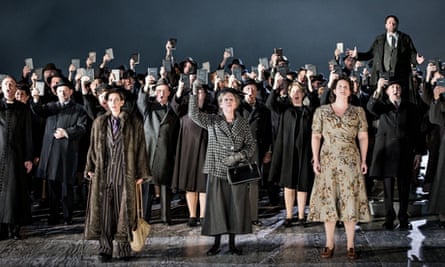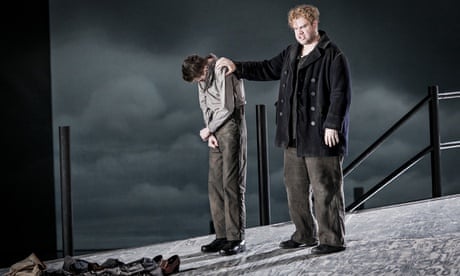Nowhere is the jeer of moral rectitude, hissed from the collective guts of a vengeful crowd, more deafening than in Britten's Peter Grimes. At the moment of crisis this Suffolk community, bigots all, spits out the accused's name three times, each instant a massed choral utterance with a deathly silence in between, save for a solitary, muted brass note eerily sounding from the orchestra pit. The last snarl is merely "Grimes!" – the small pretence of humanity in addressing him by his full name now gone. It mimics the brutality of an animal squeezing the last gulp out of its prey. In effect the "Borough" does precisely that to the fisherman of the title, whose poetic soul and violent nature makes him, irredeemably, an outsider.
In the revival of David Alden's mesmerising 2009 production for English National Opera, the superb chorus delivered these outbursts with such spleen, singing straight out to the auditorium, you felt as if turned to salt or something nastier. It's hard to think of a moment of similar starkness in all opera. With each hearing, the risk and courage of Grimes, both in music and subject matter, grows ever more potent. This is the effect of Britten's first operatic masterpiece, premiered in June 1945, one month after VE Day, by Sadler's Wells Opera, later to become ENO.

Yet even a work of such complexity and artistic richness cannot always deliver, and much of the credit for Wednesday's performance must go to Edward Gardner, who shapes Britten's music with the clarity and transparency it demands. Gardner has just announced he will stand down as music director of ENO next year to become chief conductor of the Bergen Philharmonic. However good his successor – and Mark Wigglesworth is a sharp appointment – Gardner will be missed. The orchestra, whether for love of him or the music or just because they are true professionals, gave their all.
The cast has no weak link. Each singer in this large ensemble was knowable, audible (mostly) and convincing. Stuart Skelton, the Australian tenor, reprises the title role, though nothing about his forlorn, tousle-haired, lumbering interpretation is ever anything but fresh, visceral and masterly. At the opening inquest, the lawyer Swallow (Matthew Best) barks his orders at Grimes who responds, with the same notes and words, with a dreamy lyricism. Skelton sings his pianissimo passages, notably the yearning "What harbour shelters peace", with beauty and raw vulnerability.
Alden's updating to the time of the work's composition lifts it from the locality of the Aldeburgh fishing village of George Crabbe's original poem to the lost, fearful chaos of a country recovering from war: Ellen, the bewildered widow schoolmistress (touchingly sung by Elza van den Heever); Ned Keene (Leigh Melrose), a slimy lounge lizard; the dyke-ish Auntie (Rebecca de Pont Davies), straight out of a Berlin-inspired cabaret. Mary Bevan and Rhian Lois as the Nieces, at once frumpy, sexy and semi-sapphic; Michael Colvin as the ranting Methodist Bob Boles; and Felicity Palmer, unafraid to scowl and scold as the awful Mrs Sedley all excelled. Iain Paterson's Captain Balstrode, as a naval war veteran, struggled heroically to be the conscience of us all. This Peter Grimes is menacing, sometimes overdone or grotesque, but above all it's unmissable. It will be screened live to cinemas across the UK on Sunday 23 February.
Last month, Kings Place in London launched Chamber Classics Unwrapped, in which 50 chamber works, voted by readers of BBC Music Magazine, have been programmed throughout the year. The fourth concert was given by the Tippett Quartet, whose "people's choice" was Beethoven's Quartet No 16 in F, Op 135, a mere No 26 in the list, though he is beaten by five of his own works so no complaints.
In the event, opening with the elusive Op 135 was not such a good idea. The players struggled to achieve good ensemble and all its elements: tuning and tone as well as synchronicity. This came, triumphantly, in Andrzej Panufnik's rhythmically dense, urgent and poetic String Quartet No 3 "Wycinanki" (1990). The group is currently recording his quartets, and their intimacy with his oeuvre paid off. The centenary of Panufnik's birth falls this year. The chance to revisit the music of this Polish composer, resident most of his life in London, is a pleasure in prospect.
For the closing work, Mozart's G minor quintet, the group was joined by Stephanie Gonley to play, with glowing verve, the first viola part. This melancholy work was composed around the time of Don Giovanni, probably when Mozart's father was dying. Its resultant severity denies it a place in the Chamber Classics Unwrapped Top 50. But thanks to the wonderful union of solo woodwind and string quartet in his Clarinet Quintet, Mozart is in at No 4. Inevitably, Schubert's String Quintet occupies the No 1 slot, but Messiaen's Quartet for the End of Time, the first of several 20th-century works, is impressive at No 11. Make this the year to hear chamber music. With another three dozen concerts from which to choose, Kings Place has made it easy for you.
Star ratings (out of 5)
Peter Grimes *****
Tippett Quartet ***

Comments (…)
Sign in or create your Guardian account to join the discussion